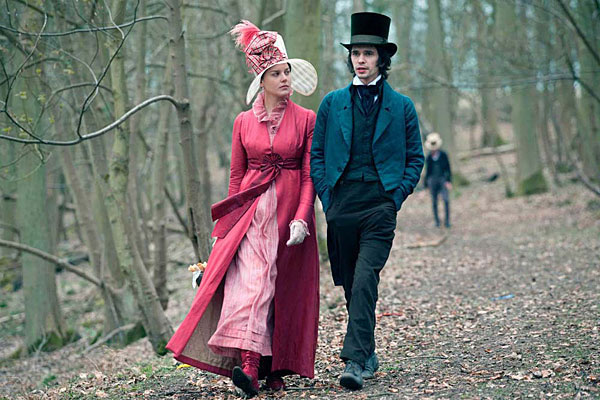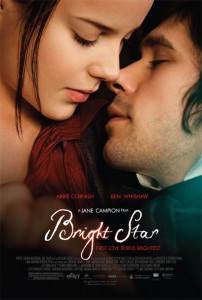
Two hundred years ago smart but ordinary people who had the gusto, if not luck, to fall in love could probably have never anticipated that there would be audiences in the future that would have sighed tenderly over their love affair. John Keats, the 1800’s poet of such treasured works as “When I Have Fears That I May Cease to Be” and “Ode to a Nightingale,” fell in love with Fanny Brawne who became not just his idolized love but his influential muse. Bright Star, which has the makings of a splendid romantic docudrama has instead been made into an inert tea-time costume recital.
Director Jane Campion’s early films “An Angel at My Table” and “The Piano” had a lyrical grace, and while she still has a fancy-quirky way with actors, the swooning passion seems to have abandoned her work that is now replaced by compact mini-series aesthetics. Her filmmaking is sluggish and static but not sweeping. Her work has become the very opposite of sumptuous. This void certainly doesn’t help “Bright Star” which would have benefitted from some good old-fashioned romantic lushness like the kind we felt, I don’t know, say “The Time Traveller’s Wife” which wasn’t groundbreaking deep but at least had larger-than-life grandeur in it. Campion in contrast doesn’t craft romantic tapestries anymore, she stages Social Studies lessons.
All this shouldn’t undermine the glow in Ben Whishaw’s (“Perfume: A Story of a Murderer”) performance as poet John Keats, a poet who passed through his lifetime penniless before being renowned as one of poetry’s greatest. When Whishaw says such lines as “You attract me, and I don’t know why… All women confuse me, even my mother,” it does not sound like a script reading, instead to its best intentions it sounds as the words are honestly flowing from his heart. Paul Schneider, as fellow poet Charles Brown, is equally impressive as the snob poet-artist who loves women less than his own pretentious superiority over them. Unfortunately Abbie Cornish, who is supposed to be the womanly heart of the film as Fanny Brawne, has become a liability in whatever film she pops up in. “A Good Year” and “Stop-Loss” are among her forgettable American film credits.
When I reviewed Abbie in the enthralling Aussie gem “Somersault,” and then “Candy,” I predicted a star in the making. Now she acts with a capital A, except there is no poetry in motion with her. Everyday people, like you and me reader, have the capacity to move nonchalantly and mindlessly through our dutiful chores. Abbie always seems to overthink gestures in her acting (watching her hold a teacup looks stressful), as a result she is always fussily laboring in her scenes. When I see the tension in the brow of her forehead, I want to supply her with a tranquilizer to placate her.
John Keats is an interesting subject for a film, and there is certainly some wonderful if short-lived moments in the film, but whatever its undefined aspirations are “Bright Star” amounts to merely average. In preparing for this review, I almost wanted to further study director John Madden and star Gwenyth Paltrows’ work in “Shakespeare in Love” to understand how they got it right, and compare how Jane Campion and Abbie Cornish have got it woefully wrong. But critical priorities demand that I reserve my heavy thinking lifting for my next film review.
119 Minutes. Rated PG.
HISTORICAL DRAMA / ROMANTIC POETS / RAINY SUNDAY NIGHT MOVIE
Film Cousins: “An Angel at My Table” (1991); “The Piano” (1993); “Tom & Viv” (1994); “Shakespeare in Love” (1998).





